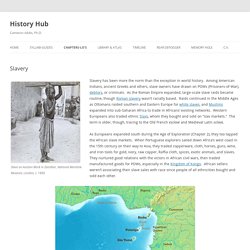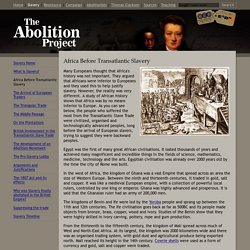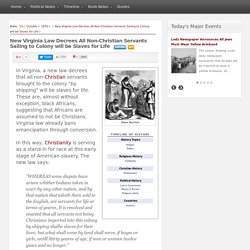

The abolition of slavery, first in northern states, then, after the end of the US Civil War, in the south. Towards reconciling an accurate account of what went on during the Reconstruction years. And recognizing what occurred in it's wake as southern whites in positions of power actively terrorized and split the loyalties of poor whites & blacks working together to meet common goals. How the federal government then withdrew from the south and stopped enforcing the 13th Amendment and other legislation developed to ensure blacks fully retained their newly legalized civil rights. Leading to the legacy of Jim Crow legislation forcing blacks to conform to a whole host of half-assed laws and codes and prison sentences that ensured segregation of the races for anything you could think of, like.
U.S. History: Last Week Tonight with John Oliver (HBO) Harriet Tubman Center for the Study of Freedom and Equity.
Jim Crow Museum: Origins of Jim Crow. In the 1880s, Chris Rutt, who had recently developed the idea of a self-rising pancake batter, attended a minstrel show that included a skit with a southern mammy character named Aunt Jemima.

Rutt and his partner, Charles Underwood, decided that the mammy, dressed in an apron and bandana, would help distinguish and sell their pancake mix. When the R.T. Davis Mill Company purchased Rutt and Underwood's company, they employed a real person to portray Aunt Jemima in their marketing scheme. Nancy Green, born a slave in Kentucky in 1834, became the first "real" Aunt Jemima. She impersonated Aunt Jemima until her death in 1923. 7/4/18: A history of plunder and struggle in Africa. WESTERN ANALYSTS often point to “corruption,” “bad governance” or a “lack of democracy” for Africa’s problems.

Hnet —Slavery.
Abolition Project- Brookes - close up: Primary Regions of African Slave Trade. History Hub. Slave on Auction Block in Zanzibar, National Maritime Museum, London, c. 1890 Slavery has been more the norm than the exception in world history.

Among American Indians, ancient Greeks and others, slave owners have drawn on POWs (Prisoners-of-War), debtors, or criminals. As the Roman Empire expanded, large-scale slave raids became routine, though Roman slavery wasn’t racially based. Raids continued in the Middle Ages as Ottomans raided southern and Eastern Europe for white slaves, and Muslims expanded into sub-Saharan Africa to trade in Africans’ existing networks. Western Europeans also traded ethnic Slavs, whom they bought and sold on “slav markets.” As Europeans expanded south during the Age of Exploration (Chapter 2), they too tapped the African slave markets. Portuguese exported these slaves to work plantations on Atlantic islands like the Azores and Canaries. Africa Before Transatlantic Slavery: The Abolition of Slavery Project. Many Europeans thought that Africa's history was not important.

They argued that Africans were inferior to Europeans and they used this to help justify slavery. However, the reality was very different. A study of African history shows that Africa was by no means inferior to Europe. As you can see below, the people who suffered the most from the Transatlantic Slave Trade were civilized, organised and technologically advanced peoples, long before the arrival of European slavers, trying to suggest they were backward peoples. Egypt was the first of many great African civilisations. BBC- Journey: The Middle Passage.
Museum Box- Triangular Slave Trade. Early In The Morning (Prison Work Song 1947-1948, lyrics & sound file) Edited by Azizi Powell This post showcases a version of the prison work song "Early In The Morning" that was sung in Parchman Farm (Mississippi State Penitentiary and recorded by Alan Lomax in 1947-1948.

This post includes an excerpt of Alan Lomax's notes about his collection of prison work songs and about "22", the nickname for the lead singer of this version of "Early In The Morning". The addendum to this post presents comments about cross cutting work songs from Barry Finn, a Anglo-American (deceased) blogger on Mudcat, an online Folk & Blues forum. The content of this post is provided for folkloric, cultural, and aesthetic purposes. All copyrights remain with their owners. Thanks to all those who are featured in this recording.
Skepticism-13 October 1670: New Virginia Law Decrees All Non-Christian Servants Sailing to Colony will be Slaves for Life. In Virginia, a new law decrees that all non-Christian servants brought to the colony "by shipping" will be slaves for life.

These are, almost without exception, black Africans, suggesting that Africans are assumed to not be Christians. Virginia law already bans emancipation through conversion. In this way, Christianity is serving as a stand-in for race at this early stage of American slavery. The new law says: "WHEREAS some dispute have arisen whither Indians taken in warr by any other nation, and by that nation that taketh them sold to the English, are servants for life or terme of yeares, It is resolved and enacted that all servants not being Christians imported into this colony by shipping shalbe slaves for their lives; but what shall come by land shall serve, if boyes or girls, untill thirty yeares of age, if men or women twelve years and no longer. " This law will be repealed in 1682.
Merikins.